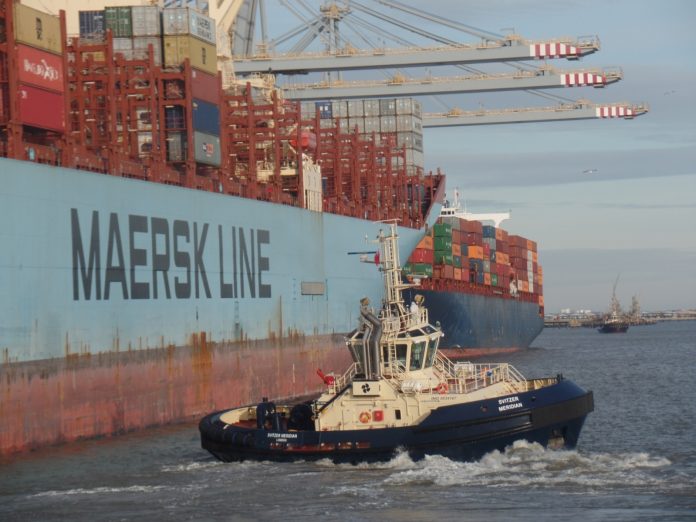Svitzer, Australia’s largest tug operator, has lodged an application with the Fair Work Commission to terminate its enterprise agreement with the Maritime Union of Australia (MUA), the Australian Institute of Marine and Power Engineers (AIMPE) and the Australian Maritime Officers (AMOU).
A.P. Moller–Maersk’s towage subsidiary said that this follows two years of negotiations with the three maritime unions, involving more than 50 meetings and two conciliation sessions facilitated by the Fair Work Commission.
Svitzer’s application to terminate the agreement was described as “an act of militant brinksmanship” by MUA, which believes it should be called out as an unhelpful and needlessly aggressive action.
“A recent ballot of Svitzer’s employees for the take-it-or-leave-it deal management put forward came back with a resounding 92% refusal from the entire workforce. This should send a clear message to Svitzer management that the deal they put on the table is unfair and unreasonable,” said MUA in a statement.
The three Australian maritime unions are affiliates of the International Transport Workers’ Federation (ITF), which said that Svitzer’s decision to terminate its collective agreement with its entire Australian workforce could further deepen the country’s supply chain woes.
Unions say the bid is an unfortunate and a departure from Maersk’s generally constructive approach towards transport workers and their rights, witnessed in recent years.
“In the last two years, companies and unions across every transport sector have been working together to get the world through the many faces of the pandemic. Companies, including Maersk, have been active alongside the ITF and many of our maritime affiliates in trying to resolve the seafarer crew change crisis,” stated ITF’s general secretary, Stephen Cotton.
“Our message is that mature, respectful industrial relation is possible. In fact, constructive dialogue with everyone at the table is the only way that we will meet the shared challenges before the industry – whether it’s securing supply chains, or transitioning shipping towards sustainability,” added Cotton.
He noted that it was important that all parts of the Maersk Group upheld workers’ rights to freedom of association and collective bargaining, provisions for which are clearly set out in the International Labour Organization’s conventions C87 and C98.
“Svitzer need not engage in a short-sighted race to the bottom that will leave tug workers worse off and our supply chains far less secure. We know that Svitzer is capable of changing the direction of its conduct in Australia, and starting instead to actually reflect the best of Maersk’s values – some of which we have seen in action during this pandemic.” Cotton continued.
“We encourage Svitzer to sit down with our affiliates and resolve this together,” he pointed out.
From Svitzer’s side, Nicolaj Noes, managing director of Svitzer Australia, said he was disappointed that the negotiations were not successful. “Svitzer has been bargaining in good faith for over two years. The process is exhausted. Terminating the agreement is the first step to a realistic resolution,” he noted.
The current agreement, which lapsed in 2019, has enabled restrictive work practices and interference in managerial and operational decision-making, leading to inefficiencies and limitations on workplace productivity, according to the tug operator.
“Svitzer is not prepared to agree to a new EA that replicates legacy terms that had been agreed more than 22 years ago, in a completely different market. We are looking to secure an EA which reflects the current market and meets our customers’ demands and expectations,” commented Noes.
Meanwhile, ITF inland navigation section chair, Yury Sukhorukov said that the Danish shipping company had an ethical responsibility to lead all the industries within which it operates towards better standards for pay and conditions, and health and safety.
A termination bid by Svitzer would push hundreds of Australian tug and towage workers onto the bare legal minimums for pay and conditions, according to ITF, which noted that this would result in the loss of union-won restrictions on excessive hours critical to prevent fatigue.
“While this behaviour is unacceptable from any employer, it is particularly disappointing because maritime workers and our unions have worked so hard to build robust, respectful industrial relationships with Maersk and its subsidiaries. The Maersk Group has benefited from these constructive global relationships to make enormous revenues through the pandemic – but now the company has chosen to switch its approach by endorsing Svitzer’s shameless antagonism towards workers in our important, but often undervalued, tug sector,” said Sukhorukov.
The chair added that when the ITF began to analyse major areas of risk to global supply chains, towage services in ports and harbours was identified as a significant risk by the federation’s researchers.
“The ‘race to the bottom’ we see in many tug markets, with operators undercutting each other, inevitably leads to lower labour and safety standards,” continued Sukhorukov, who believes it is “unwise for shipping companies and other port clients to pile so much risk onto this critical sector – a rise in accidents, injuries, and stalled supply chains are all completely foreseeable outcomes.”
Sukhorukov said that if Svitzer really believes that the company cannot run a profitable tug operation while also paying fair wages and ensuring safe conditions onboard, then the ITF would strongly suggest Svitzer speak to their parent company about using Maersk Shipping Line’s considerable market presence to ease the downward pressure on tug suppliers such as Svitzer.
“I am sure that when Maersk Group takes the time to stand back and see the bigger picture, they will come to understand that everyone benefits from a safe, secure and stable tug sector. We look forward to Maersk, therefore, reasserting its support for the rights of tug workers to collectively bargain for fair wages, secure jobs, and safe hours of work and rest – of course, as part of a new collective agreement with our fraternal unions in Australia,” concluded ITF inland navigation section chair.







